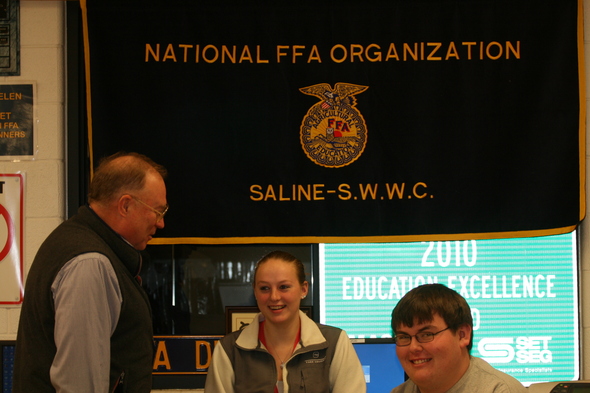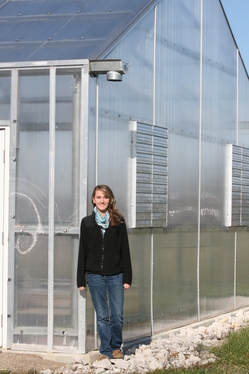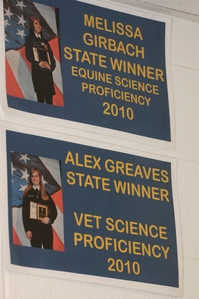Natural resources, agriculture studies part of South and West Washtenaw Consortium at Saline High School

David Mellor, natural resources and agricultural sciences teacher, works with students Sheri Robbins and Billy Poet inside the agriculture classroom at Saline High School.
Lisa Allmendinger | AnnArbor.com
The students in this specialized agricultural program, like those students in the other specialized programs such as culinary or life sciences offered through the South and West Washtenaw Consortium, consider themselves “a family.”
“We are forced to get out of our comfort zones and assume leadership roles,” Schneider said.
Through the agriscience program, the Saline High School senior has served as both the treasurer and president of Future Farmers of America, and plans to attend the University of Findlay in Ohio and study equine science where she’ll pursue a bachelor’s degree in training so she can run a family horse farm and teach children to ride.

Kristina Schneider outside the newly constructed greenhouse at Saline High School.
Lisa Allmendinger | AnnArbor.com
Students in this consortium program take a group of related courses that prepare them for careers or college courses in agriculture, natural resources and related sciences. They cover topics such as agricultural biology, plan science, animal science, business management and marketing, mechanical technology, natural resources, environmental science, communications, leadership and personal development.
Sheri Robbins, a senior from Chelsea, said “I’ve learned so much from the program and it’s so hand’s on.”
The students also participate in FFA, a national program that teaches both leadership and agricultural skills.
“I learned a lot through FFA,” Robbins said, adding she is also enrolled at Baker College in the school’s veterinary tech program.
Billy Poet, a Saline High School student, said those enrolled in the program have built a new greenhouse and planted marsh grasses around a pond near Saline High School to reduce the pH content in the water caused by geese droppings that pollute the water.
He said students have learned about meat production, growing vegetables, crops, floral arrangements chicken, diary and meat production and processing as well as turf management and botany.
They also compete in a number of FFA competitions and attend the national convention each year.

Several of the many FFA contest winners from Saline High School.
Lisa Allmendinger | AnnArbor.com
Freshman and sophomores can take agricultural biology while sophomores can take botany-plants systems. Juniors take zoology- pre-veterinary systems and seniors take either botany II or zoology II and receive hands-on experience such as starting a business or working for an established company.
The plant systems horticulture class gives students a foundation in plant nutrition needed to keep animals healthy.
According to the course guide, plant systems horticulture in a year-long class that introduces students to green industry careers such as a florist, greenhouse manager, alternative energy engineer, urban forester, sports field manager, soil conservationist, farm manager or “other careers working with and caring for crops or plants in the future.”
Students learn about classification, selection, anatomy, physiology, genetics, breeding, nutrition, health, judging of plants and plant products, plant pests and “meeting human needs with plants and their importance to the Michigan economy,” according to class descriptions.
They are also given an introduction to alternative energy systems such as bio-fuels, solar, wind, wave, and fuel cell technology.
Students care for plants in a hydroponic lab and a new greenhouse as well as in school landscapes, wetlands, forest and crop and sports fields.
In the Animal Systems pre-veterinary science classes, students interested in an animal industry career as a veterinarian, vet tech, horse trainer, animal groomer, pet store manager, game warden, farm manager are given a foundation in zoology studies.
Students raise broiler chicks and fish in a lab and conduct outdoors studies of the habitat of animal species in the forest, field and wetlands area of the school campus.
They also participate in Michigan FFA judging contests in areas such as horse judging, poultry, meat and dairy foods contests, and the courses are taught by longtime instructor David Mellor.
And, in February, it’s expected that students will begin using the new greenhouse that they built earlier this year.
Lisa Allmendinger is a regional reporter for AnnArbor.com. She can be reached at lisaallmendinger@annarbor.com. For more Saline stories, visit our Saline page.


Comments
SpamBot1
Sun, Dec 18, 2011 : 7:28 p.m.
Mr. Mellor should be proud for creating such a valuable curriculum. His is one of the many programs that make Saline such an incredible district.
shepard145
Sun, Dec 18, 2011 : 5:14 p.m.
It's good to see a vital part of our economy respected in Saline rather then trivialized into something handed over to a cabal of eco hysteric activists masquerading as teachers in their latest search for a paycheck. There are several eco majors at UM and other placed that equip graduates for little more then lifetimes of eco whining but otherwise of virtually no value in a market economy. Once the final nail is put in the Global Warming (human controlled global weather fraud), I wonder how many of those diplomas will become monuments to an embarrassing, scientific dark age when polling science workers replaced the scientific method and rigorous debate was replaced by cries of "it's over" and "deniers" by liberal arts graduates in the press who feel rather then comprehend. Good to see that "horse trainer" is still something folks are pursuing, though I'm not sure how much leadership is really required for that major. - other than don't let the horse boss you around.
shepard145
Tue, Dec 20, 2011 : 2:16 a.m.
Then you would have learned nothing! :-)
SpamBot1
Sun, Dec 18, 2011 : 7:29 p.m.
I wish you would have stopped with "It's good to see a vital part of our economy respected in Saline."
DonBee
Sun, Dec 18, 2011 : 4:18 p.m.
Congratulations to the FFA award winners and this winning program. This is what the county needs more of, programs that prepare students for careers. Thank you David Mellor for making this program go. If you think a football coach works a lot of hours follow an FFA advisor around for a year.
Anita
Mon, Jan 2, 2012 : 11:56 p.m.
Right, being an FFA advisor is like coaching a varsity sport every season--fall, winter, spring and summer. Except FFA advisors don't get comparable pay for it.
Vivienne Armentrout
Sun, Dec 18, 2011 : 3:49 p.m.
I have visited the Saline facility and met Mr. Mellor. It is very impressive. We are so fortunate to have a program like this in Washtenaw County to support our budding agricultural economy. We have more and more diversification and availability of local foods because a number of young people are assuming the risks and hard work to grow it for us. (The traditional corn and soybean row crops have their place, but only diversified agriculture puts real food on the table.) In order to continue the growth of a diverse agricultural economy, training made available to young people is a valuable asset. There is a lot of specialized knowledge needed, and hands-on practice is important too. Great program.
Vivienne Armentrout
Sun, Dec 18, 2011 : 8:44 p.m.
Yes, it was awkwardly worded. I'm sure I'll be eating something today that began its life in a soy or corn row. I try to avoid it as much as possible, though, by eating food made from scratch with origiinal ingredients rather than prepared foods. (Okay, I buy some meat at Knight's, so I imagine that derives in part from grains.) Commodity crops, especially corn and soy, may be consumed locally but mostly go into the international commodities market. Fresh locally produced vegetables, fruit, meat and dairy (there is also some local grain like the Westwind Milling products) are what I am referring to when I say "real" food.
average joe
Sun, Dec 18, 2011 : 8:27 p.m.
I fully understand what you are trying to say, but when you state-"(The traditional corn and soybean row crops have their place, but only diversified agriculture puts real food on the table.)" , you make it sound like corn & soybeans are not 'real' food. Kind of made me chuckle....